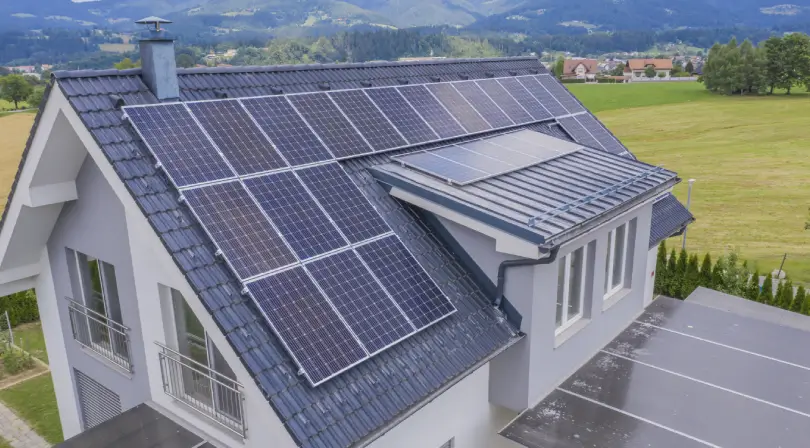Harness the power of the sun with residential solar solutions. Save on energy bills, boost home efficiency, and enjoy clean, sustainable solar power today! As we continue the search for sustainable living practices and ways to reduce carbon footprints, residential solar solutions have emerged as the golden ticket. Utilizing the unending energy of the sun, a residential solar solution offers a clean, renewable and possibly inexpensive source of home or building energy. Residential solar technologies have grown much more accessible and also provided lower consumption costs as they have become more efficient, viable systems as they continue to grow and evolve. Residential solar solutions are changing the way we power our homes!
RELATED : ENERGY
Understanding Residential Solar Solutions
At its core, a residential solar solution involves the installation of solar panels on rooftops or other suitable locations on a homeowner’s property. These panels, comprised of photovoltaic cells, capture sunlight and convert it into electricity through the photovoltaic effect. This generated electricity can then be used to power household appliances, lighting, heating systems, and more.
Components of a Residential Solar System
- Solar Panels: These are the primary components responsible for capturing sunlight and converting it into electricity. Solar panels are typically made of silicon cells, which are interconnected to form modules.
- Inverter: The electricity generated by solar panels is in direct current (DC) form, but most household appliances operate on alternating current (AC). An inverter converts DC electricity into AC electricity, making it compatible with the electrical grid and household devices.
- Mounting Structure: Solar panels need to be securely mounted on rooftops or other structures to maximize sunlight exposure. Mounting structures ensure stability and optimal positioning for efficient energy production.
- Monitoring System: Many modern solar solutions come equipped with monitoring systems that allow homeowners to track energy production and consumption in real-time. These systems provide valuable insights into energy usage patterns and help optimize efficiency.
Benefits of Residential Solar Solutions
- Cost Savings: One of the most significant advantages of residential solar solutions is the potential for long-term cost savings. By generating electricity onsite, homeowners can reduce their dependence on traditional utility providers and lower their monthly energy bills.
- Environmental Impact: Solar energy is a clean and renewable resource that produces no greenhouse gas emissions or air pollutants during operation. By choosing solar, homeowners can significantly reduce their carbon footprint and contribute to mitigating climate change.
- Energy Independence: Solar power provides homeowners with a degree of energy independence, reducing reliance on centralized power grids and volatile energy markets. This autonomy offers greater stability and resilience in the face of power outages or disruptions.
- Increased Property Value: Studies have shown that homes equipped with solar panels tend to have higher property values and sell faster than comparable non-solar homes. Solar installations are viewed as desirable features that appeal to environmentally conscious buyers.
Cybersecurity and AI Importance
Considerations for Implementing Residential Solar Solutions
While the benefits of residential solar solutions are clear, several factors should be considered before investing in a solar system:
- Initial Investment: While the long-term savings from solar energy can be substantial, the upfront cost of purchasing and installing a solar system can be significant. However, various financing options, including loans, leases, and power purchase agreements, are available to make solar more affordable for homeowners.
- Site Suitability: The effectiveness of a solar system depends on factors such as the orientation and angle of the roof, shading from nearby trees or buildings, and local climate conditions. A professional solar installer can assess the suitability of a site and recommend the optimal system size and configuration.
- Regulatory and Incentive Landscape: Government incentives, such as tax credits, rebates, and net metering policies, can significantly offset the cost of installing a solar system. Homeowners should familiarize themselves with local regulations and incentives to maximize their savings.
- Maintenance and Warranties: While solar panels require minimal maintenance, homeowners should be aware of warranty terms and coverage for equipment such as panels, inverters, and mounting structures. Regular inspection and cleaning may be necessary to ensure optimal performance and longevity.
Find More: Download Instagram Videos and Reels
Looking Ahead: The Future of Residential Solar Solutions
Technology will continue to grow and scale economics are driving prices down, residential solar solutions will continue to promise future growth. Innovations like solar shingles, energy storage systems, and smart grid technology are all set to improve solar power efficiency and affordability.
As environmental concerns continue to grow and individuals increasingly pursue sustainable options, residential solar solutions can be one route to a cleaner, greener tomorrow. Residential solar solutions give homeowners a way to use the power of the sun to eliminate their negative environmental impact while also potentially establishing financial independence and clean energy. As more people adopt solar energy, residential solar solutions will have an increasingly larger impact on the energy futures of tomorrow.
RELATED: UTE Canopies for truck

